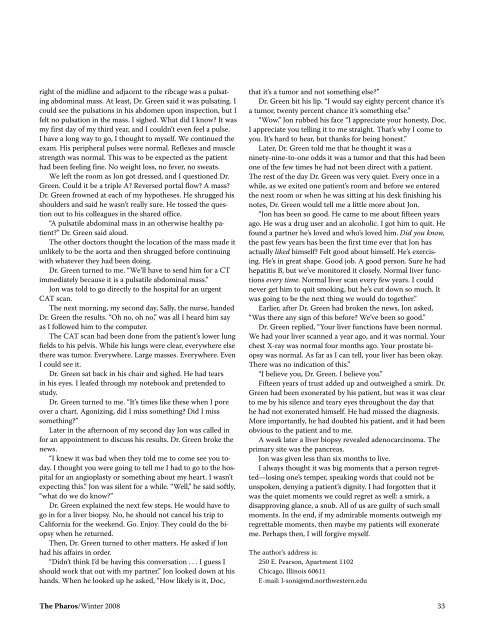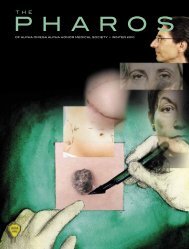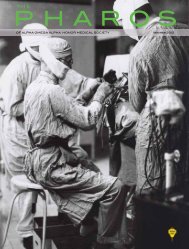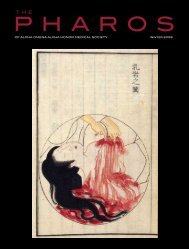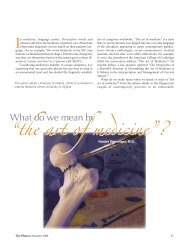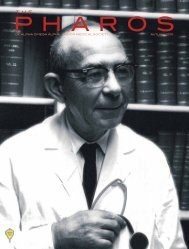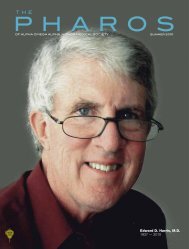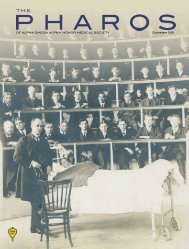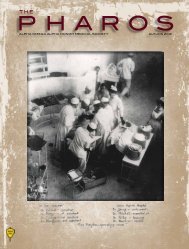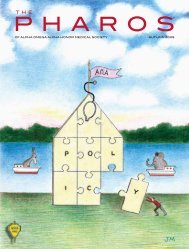Download The Pharos Winter 2008 Edition - Alpha Omega Alpha
Download The Pharos Winter 2008 Edition - Alpha Omega Alpha
Download The Pharos Winter 2008 Edition - Alpha Omega Alpha
Create successful ePaper yourself
Turn your PDF publications into a flip-book with our unique Google optimized e-Paper software.
ight of the midline and adjacent to the ribcage was a pulsating<br />
abdominal mass. At least, Dr. Green said it was pulsating. I<br />
could see the pulsations in his abdomen upon inspection, but I<br />
felt no pulsation in the mass. I sighed. What did I know? It was<br />
my first day of my third year, and I couldn’t even feel a pulse.<br />
I have a long way to go, I thought to myself. We continued the<br />
exam. His peripheral pulses were normal. Reflexes and muscle<br />
strength was normal. This was to be expected as the patient<br />
had been feeling fine. No weight loss, no fever, no sweats.<br />
We left the room as Jon got dressed, and I questioned Dr.<br />
Green. Could it be a triple A? Reversed portal flow? A mass?<br />
Dr. Green frowned at each of my hypotheses. He shrugged his<br />
shoulders and said he wasn’t really sure. He tossed the question<br />
out to his colleagues in the shared office.<br />
“A pulsatile abdominal mass in an otherwise healthy patient?”<br />
Dr. Green said aloud.<br />
<strong>The</strong> other doctors thought the location of the mass made it<br />
unlikely to be the aorta and then shrugged before continuing<br />
with whatever they had been doing.<br />
Dr. Green turned to me. “We’ll have to send him for a CT<br />
immediately because it is a pulsatile abdominal mass.”<br />
Jon was told to go directly to the hospital for an urgent<br />
CAT scan.<br />
<strong>The</strong> next morning, my second day, Sally, the nurse, handed<br />
Dr. Green the results. “Oh no, oh no,” was all I heard him say<br />
as I followed him to the computer.<br />
<strong>The</strong> CAT scan had been done from the patient’s lower lung<br />
fields to his pelvis. While his lungs were clear, everywhere else<br />
there was tumor. Everywhere. Large masses. Everywhere. Even<br />
I could see it.<br />
Dr. Green sat back in his chair and sighed. He had tears<br />
in his eyes. I leafed through my notebook and pretended to<br />
study.<br />
Dr. Green turned to me. “It’s times like these when I pore<br />
over a chart. Agonizing, did I miss something? Did I miss<br />
something?”<br />
Later in the afternoon of my second day Jon was called in<br />
for an appointment to discuss his results. Dr. Green broke the<br />
news.<br />
“I knew it was bad when they told me to come see you today.<br />
I thought you were going to tell me I had to go to the hospital<br />
for an angioplasty or something about my heart. I wasn’t<br />
expecting this.” Jon was silent for a while. “Well,” he said softly,<br />
“what do we do know?”<br />
Dr. Green explained the next few steps. He would have to<br />
go in for a liver biopsy. No, he should not cancel his trip to<br />
California for the weekend. Go. Enjoy. <strong>The</strong>y could do the biopsy<br />
when he returned.<br />
<strong>The</strong>n, Dr. Green turned to other matters. He asked if Jon<br />
had his affairs in order.<br />
“Didn’t think I’d be having this conversation . . . I guess I<br />
should work that out with my partner.” Jon looked down at his<br />
hands. When he looked up he asked, “How likely is it, Doc,<br />
that it’s a tumor and not something else?”<br />
Dr. Green bit his lip. “I would say eighty percent chance it’s<br />
a tumor, twenty percent chance it’s something else.”<br />
“Wow.” Jon rubbed his face “I appreciate your honesty, Doc.<br />
I appreciate you telling it to me straight. That’s why I come to<br />
you. It’s hard to hear, but thanks for being honest.”<br />
Later, Dr. Green told me that he thought it was a<br />
ninety-nine-to-one odds it was a tumor and that this had been<br />
one of the few times he had not been direct with a patient.<br />
<strong>The</strong> rest of the day Dr. Green was very quiet. Every once in a<br />
while, as we exited one patient’s room and before we entered<br />
the next room or when he was sitting at his desk finishing his<br />
notes, Dr. Green would tell me a little more about Jon.<br />
“Jon has been so good. He came to me about fifteen years<br />
ago. He was a drug user and an alcoholic. I got him to quit. He<br />
found a partner he’s loved and who’s loved him. Did you know,<br />
the past few years has been the first time ever that Jon has<br />
actually liked himself? Felt good about himself. He’s exercising.<br />
He’s in great shape. Good job. A good person. Sure he had<br />
hepatitis B, but we’ve monitored it closely. Normal liver functions<br />
every time. Normal liver scan every few years. I could<br />
never get him to quit smoking, but he’s cut down so much. It<br />
was going to be the next thing we would do together.”<br />
Earlier, after Dr. Green had broken the news, Jon asked,<br />
“Was there any sign of this before? We’ve been so good.”<br />
Dr. Green replied, “Your liver functions have been normal.<br />
We had your liver scanned a year ago, and it was normal. Your<br />
chest X-ray was normal four months ago. Your prostate biopsy<br />
was normal. As far as I can tell, your liver has been okay.<br />
<strong>The</strong>re was no indication of this.”<br />
“I believe you, Dr. Green. I believe you.”<br />
Fifteen years of trust added up and outweighed a smirk. Dr.<br />
Green had been exonerated by his patient, but was it was clear<br />
to me by his silence and teary eyes throughout the day that<br />
he had not exonerated himself. He had missed the diagnosis.<br />
More importantly, he had doubted his patient, and it had been<br />
obvious to the patient and to me.<br />
A week later a liver biopsy revealed adenocarcinoma. <strong>The</strong><br />
primary site was the pancreas.<br />
Jon was given less than six months to live.<br />
I always thought it was big moments that a person regretted—losing<br />
one’s temper, speaking words that could not be<br />
unspoken, denying a patient’s dignity. I had forgotten that it<br />
was the quiet moments we could regret as well: a smirk, a<br />
disapproving glance, a snub. All of us are guilty of such small<br />
moments. In the end, if my admirable moments outweigh my<br />
regrettable moments, then maybe my patients will exonerate<br />
me. Perhaps then, I will forgive myself.<br />
<strong>The</strong> author’s address is:<br />
250 E. Pearson, Apartment 1102<br />
Chicago, Illinois 60611<br />
E-mail: l-soni@md.northwestern.edu<br />
<strong>The</strong> <strong>Pharos</strong>/<strong>Winter</strong> <strong>2008</strong> 33


